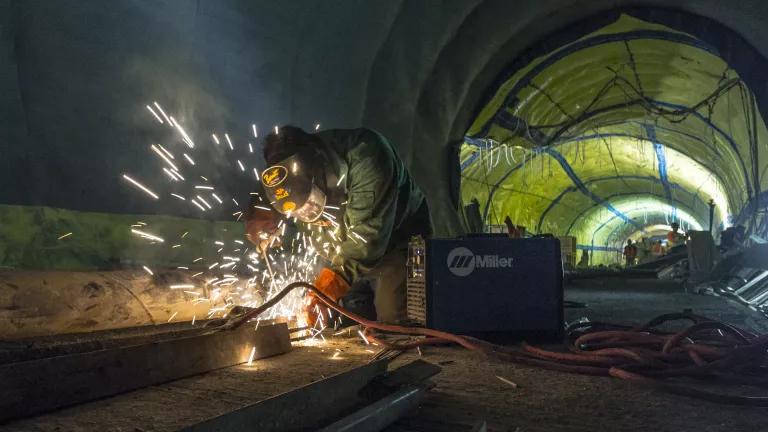Federal Judge: Gas Companies Can't Force New York Landowners to Extend Lease Agreements Against Their Will
Last week, federal Judge David Hurd ruled, in two separate decisions, that sixty-five New York landowners will not be forced to extend the terms of their lease agreements with gas drilling companies against their will. The decisions are the first to interpret the so-called force majeure clauses in drilling leases in light of the state’s current de facto moratorium on fracking, and set a precedent for landowners statewide who were convinced to sign leases long before anyone had heard about “high volume hydraulic fracturing.”
What does a force majeure clause do, you ask? Normally, a force majeure clause is something that is inserted in a contract to excuse the contracting parties from doing what they promised to do if a totally unforeseeable “act of God” makes it impossible for them to fulfill their promise. For example, if I have a contract with you to paint your house, I am obligated to go and paint it. But if a tornado comes and knocks your house down before I get there (and this may seem obvious), I no longer have to paint your house.
In the fracking world, most drilling leases require the gas companies to drill a well within a particular period of time (usually 5-10 years), and if not, the lease expires. Most of these leases also have force majeure clauses that allow the companies to extend the lease automatically if an unforeseeable act makes drilling a well within that time frame impossible.
In New York, because the state continues to review the significant environmental harms of “high volume hydraulic fracturing,” no permits for this type of fracking have been issued. Because gas companies claim that high volume fracking is the only extraction method economically “practicable” for New York, most have argued that the state’s de facto moratorium on high volume fracking is exactly the type of “act of God” that allows them to keep extending leases past their expiration date.
So why is the state’s de facto moratorium not a force majeure? Judge Hurd found a number of compelling reasons:
- The moratorium doesn’t make drilling impossible – Drilling leases generally give gas companies the right to drill for all the oil and gas on the property by any possible drilling method. This includes low volume fracking and traditional oil and gas drilling. Just because companies cannot use high volume fracking, does not mean they are prevented from drilling.
- The companies could have foreseen the state’s environmental review process – There is nothing new about the state’s environmental review of high volume fracking. Under New York law, all activities permitted by the state that have the potential to significantly harm the environment must be studied before permits are issued. Because high volume fracking poses serious potential risks and has never been studied before, gas companies should have seen environmental review coming.
- Drilling leases do not guarantee profits – Drilling leases allow companies to dig holes in the ground, they don’t guarantee that the companies will make a profit doing so. As Judge Hurd said, “the oil and gas industry is a speculative business; [landowners] did not guarantee production nor that [gas companies] would profit, and [gas companies] did not guarantee production nor that [landowners] would receive royalties.” Just because high volume fracking is the only profitable method to drill does not mean that gas companies can rewrite their contracts; it means they made a bad deal.
To be clear, the leases that these cases apply to are older, expired leases—ones that were entered in to when the only people who knew anything about high volume fracking were the gas companies. Landowners who signed up expecting traditional drilling were soon surprised to learn that the fracking that gas companies had been planning all along was something very different altogether. Last week’s ruling not only holds gas companies to the contracts they signed, it provides welcome relief to landowners who for years have felt duped.
Although Judge Hurd’s ruling only affects the leases of the families involved in this particular lawsuit, we hope it will set a precedent for future court challenges to similar provisions of other leases. When companies have no legal right to drill, landowners, like communities, should not be strong-armed into accepting fracking.




